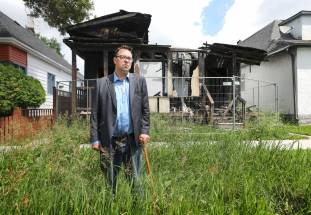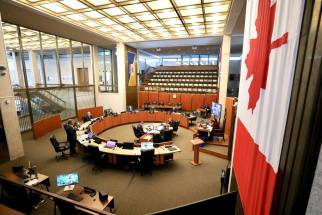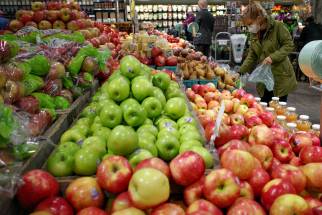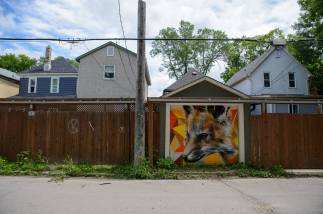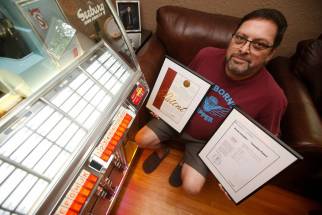Sprouting like weeds The number of licensed cannabis shops in Manitoba has jumped from six in October 2018 to 160
Read this article for free:
or
Already have an account? Log in here »
To continue reading, please subscribe:
Monthly Digital Subscription
$0 for the first 4 weeks*
- Enjoy unlimited reading on winnipegfreepress.com
- Read the E-Edition, our digital replica newspaper
- Access News Break, our award-winning app
- Play interactive puzzles
*No charge for 4 weeks then price increases to the regular rate of $19.00 plus GST every four weeks. Offer available to new and qualified returning subscribers only. Cancel any time.
Monthly Digital Subscription
$4.75/week*
- Enjoy unlimited reading on winnipegfreepress.com
- Read the E-Edition, our digital replica newspaper
- Access News Break, our award-winning app
- Play interactive puzzles
*Billed as $19 plus GST every four weeks. Cancel any time.
To continue reading, please subscribe:
Add Free Press access to your Brandon Sun subscription for only an additional
$1 for the first 4 weeks*
*Your next subscription payment will increase by $1.00 and you will be charged $16.99 plus GST for four weeks. After four weeks, your payment will increase to $23.99 plus GST every four weeks.
Read unlimited articles for free today:
or
Already have an account? Log in here »
Hey there, time traveller!
This article was published 15/07/2022 (1246 days ago), so information in it may no longer be current.
Chris Britton wants to sell you cannabis.
He’s got a chandelier hanging from the ceiling. He’s behind a bar he made from refurbished pallets. There’s a velvet chair and an old wooden cabinet filled with bongs.
The owner of Black Tie Cannabis will greet you in a button-down shirt and tie.

“My goal with this… is how do you get a soccer mom to buy a pack of joints or gummies instead of buying a bottle of wine?” the entrepreneur tells the Free Press.
“We try to create a very professional business atmosphere.”
Last month, he celebrated his Charleswood shop’s first anniversary in the cannabis industry. He has visions of opening another store — business has been steadily increasing, helped by the shop’s beginnings as a vape distributor.
However, he’s not alone. A one-minute walk west takes customers to The Cannabis Market. From there, folks can cross Dale Boulevard to Farmer Jane Cannabis Co., roughly 350 metres from Black Tie.
“Without the amount of competition I have within one block of me, we would be doing better numbers,” Britton says. “It definitely makes it so that you are fighting for every inch that you’ve got.”
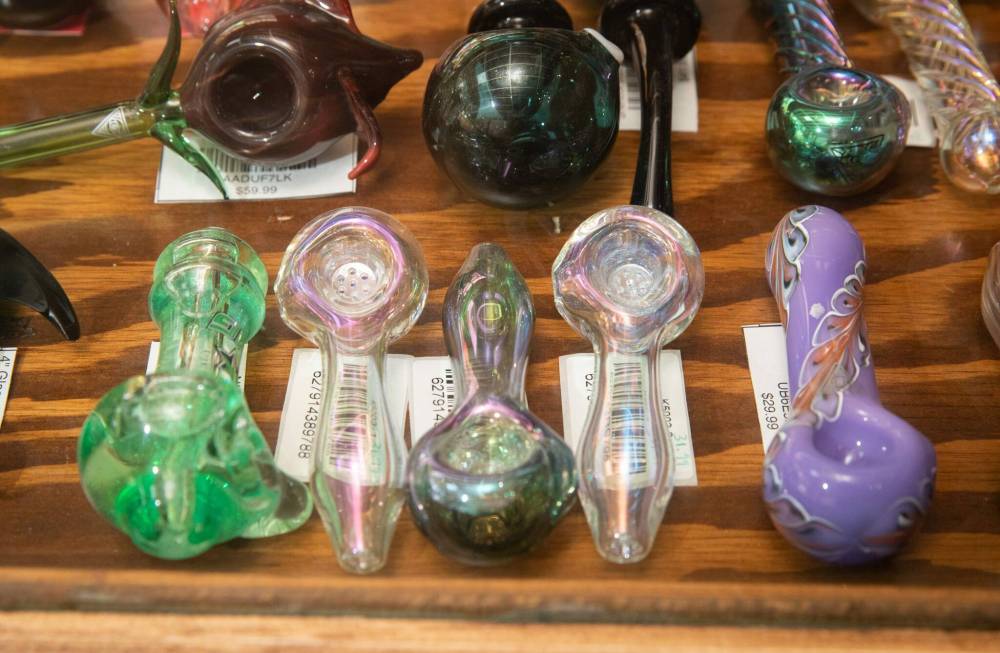
Manitoba had 158 cannabis retailers licensed by the Liquor, Gaming and Cannabis Authority of Manitoba as of Monday. It’s a staggering number, considering six shops opened their doors upon legalization in 2018.
Over the course of 13 months — from June 1, 2021 until Monday — the LGCA issued 75 retail cannabis licences, accounting for 46 per cent of the licences granted since the drug’s legalization in October 2018.
That makes standing out important, Britton says.
“We can all provide the same products, we have the same catalogue,” he says, referring to the Manitoba Liquor and Lotteries-curated list from which all Manitoba cannabis retailers choose the goods they sell.
“If we’re not taking the time to select things, and if we’re not doing those extras — that’s all we can do,” Britton says.
Several business owners in the industry, including Britton, expect to see store closures in the coming year. Many are concerned about their own company’s prospects for survival.
● ● ●
Six cannabis shops opened in Manitoba on Oct. 17, 2018. Ottawa had just implemented the Cannabis Act, legalizing a drug that had been blacklisted for 95 years.
Manitoba had issued a request for proposals from potential recreational cannabis retailers 11 months prior to legalization. It received more than 100 submissions, a December 2017 news release from the provincial government said.
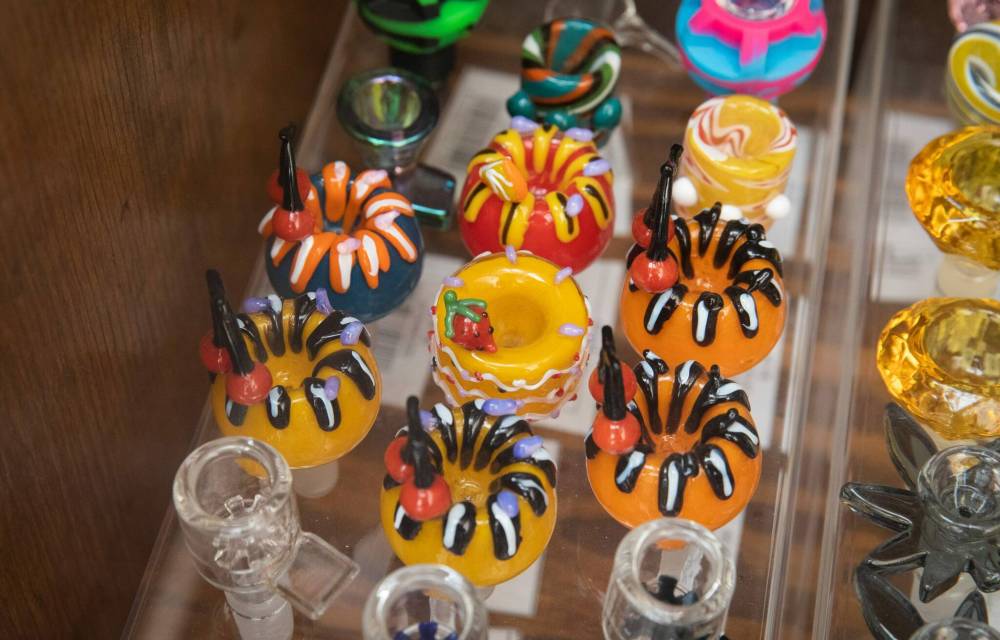
Ultimately, the province inked four deals, including a consortium of Delta 9 Cannabis Inc. and Canopy Growth Corp. Both had large production facilities, and Delta 9 had made promises to hire hundreds of people.
The second, National Access Cannabis, was an established name with medical cannabis centres across Canada.
Tokyo Smoke, a branch of Hiku Brands, got a contract, as did a new corporation made up of Indigenous groups.
Cannabis vs. liquor
Manitoba stores cannot sell both cannabis and liquor. Below are statistics on the two.
• Manitoba had 160 cannabis shops and 488 liquor stores as of mid-July.
• Manitoba Liquor and Lotteries reported $80.2 million in revenue from cannabis operations in the 2020-21 fiscal year. It reported $886 million in revenue from liquor operations during the same period.
“Our goal within two years of legalization is for 90 per cent of Manitobans to be able to access legal cannabis within a 30-minute drive or less,” then-Growth, Enterprise and Trade Minister Blaine Pedersen was quoted saying in a July 2018 provincial news release.
The goal was to offer users across the province “the opportunity to switch from the illegal market to the legal market,” a provincial spokesperson told the Free Press in a recent email.
Sport, Culture and Heritage Minister Minister Andrew Smith, who currently has responsibility for Manitoba Liquor and Lotteries, was not made available for an interview.
It was clear 2018 wasn’t a time for small independents to enter Manitoba’s cannabis industry, Britton says, adding he’d have set up shop then if he’d had the opportunity.
That October, two Tweed locations, a Delta 9, a Tokyo Smoke and a Meta Cannabis opened in Winnipeg. Tweed also opened in Dauphin.
“Due to the short timeframe for legalization of the cannabis market… it was not possible to conduct the thorough legal background vetting required on every company interested in participating in the new open cannabis market,” the provincial spokesperson wrote.
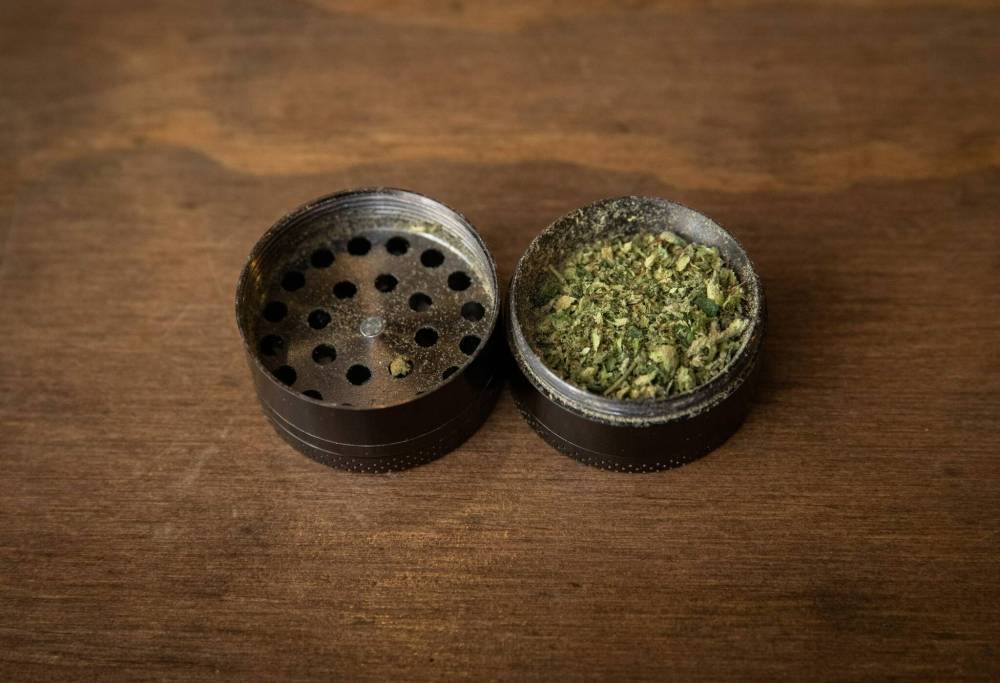
The government limited the number of cannabis shops out of concern there wouldn’t be enough Health Canada-licensed processors to serve the market, according to Manitoba Liquor and Lotteries’ website.
The province accepted more applications in July 2018. Those companies were put on a list to operate stores beyond Winnipeg’s boundaries. Companies were selected in May of 2019.
Within the first year, 27 cannabis shops were operating in Manitoba.
● ● ●
The number has more than quintupled in less than four years.
Take Winnipeg’s first Delta 9, which opened at 827 Dakota St. When it launched, the closest cannabis shops were, roughly, seven kilometres away.
Now, customers can drive two minutes away to Nimbus Cannabis. Spiritleaf, Fire & Flower, Up In Sky Cannabis & Tobacconist, The Joint Cannabis Shop and Atomic Flower Cannabis are all located within 4.5 km of the St. Vital Delta 9.
After June 2020, the province opened the floodgates, allowing anyone to apply to MLL for a cannabis store retailer agreement, and stores began popping up all over the place.
By then, the legal market had established itself, the provincial spokesperson wrote in an email.
“The goal of cannabis legalization in Manitoba was always to move to a market driven, first come first served basis,” the email said.
At the time, 30 Manitoba shops were selling (with age-restricted licences; only adults 19 and older can enter).
“Now, the market is insanely over-saturated with cannabis dispensaries,” says Shira Bellan, co-owner of Character Co., a Corydon Avenue shop. “It’s challenging, to say the least.”
As of Thursday, Winnipeg had 93 cannabis stores.
There is no limit on how many businesses can access retail cannabis licences.
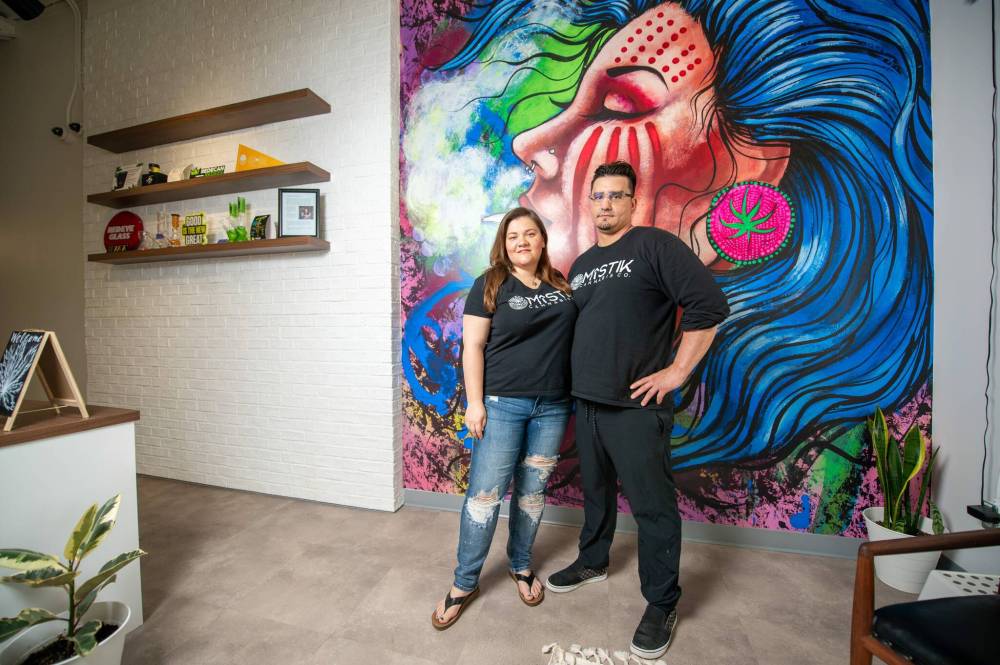
Several entrepreneurs the Free Press spoke to say the licensing process went smoothly for them. Dealing with both Manitoba Liquor and Lotteries and the LGCA could get complicated — the MLL must enter a retailer agreement with potential cannabis shops before the owner can get a LGCA licence — but “the process was pretty clear,” says Melanie Bekevich, co-owner of Mistik Cannabis Co.
● ● ●
The race was on.
Business owners who’d been long awaiting the chance to enter Manitoba’s recreational pot market were finally submitting their papers.
Veronica Padilla applied last year. By the time she got her licence to open Babette’s Cannabis Dispensary at 3228 Portage Ave., the number of competitors had seemingly doubled, she says.
“There was no clear limit of how many licences the LGCA would give out,” Padilla said. “It wasn’t information that was out there.”
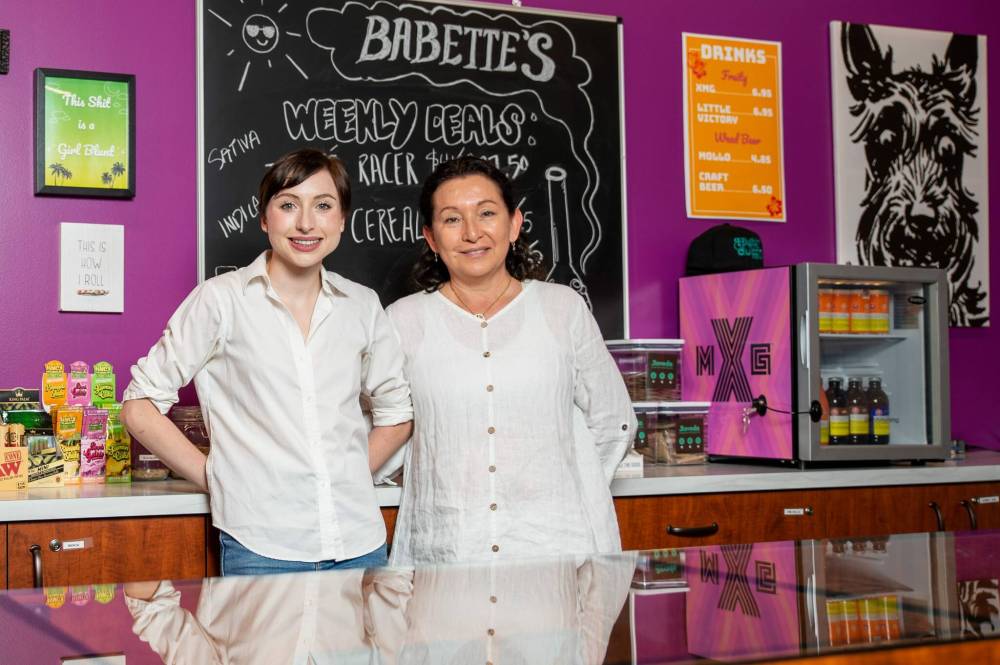
Her store is across Portage Avenue from The Joint Cannabis Shop. It’s a less-than-10 minute walk from Delta 9 and Tokyo Smoke, and about a five-minute drive from a Spiritleaf and a Flamingo + Cannabis.
“In the private market, in many cases, you don’t know you have a competitor getting ready to open because you don’t know who the landlord three doors down is negotiating with,” says Brad Poulos, a lecturer in entrepreneurship and strategy at Toronto Metropolitan University.
It can come as a shock to see one — or several — peers pop up on the same street, Poulos notes.
Meantime, the number of cannabis users hasn’t increased much in Manitoba since legalization.
A quarter of Manitobans use cannabis, according to a 2021 Statistics Canada report. In 2018 — the year of legalization — 22 per cent of Manitobans used the drug.
“There was no clear limit of how many licences the LGCA would give out. It wasn’t information that was out there.”
– Veronica Padilla
“At the margin, you might see the odd person that dabbles in it that didn’t before because it was illegal,” says Poulos, who specializes in cannabis retail. “In essence, (legalization) does not create new users.”
Approximately half of users, nationally, still turn to the illicit market for their supply. But the number of people buying legally has grown — 53 per cent chose legal storefronts in 2021, compared to 41 per cent the year earlier, Statistics Canada data shows.
“Cannabis users by definition, 3 1/2 years ago, they were all criminals,” Poulos says. “Every time they bought cannabis, they were engaging in an illegal act…. They’re not uncomfortable doing so.”
Someone who has purchased weed illegally for nearly 30 years and continues to to so, tells the Free Press he won’t switch to legal products. He’s had the same dealer for decades, he believes he gets good quality for significantly lower prices that what stores have to charge and the black market is well ahead when it comes to the products on offer, he says.
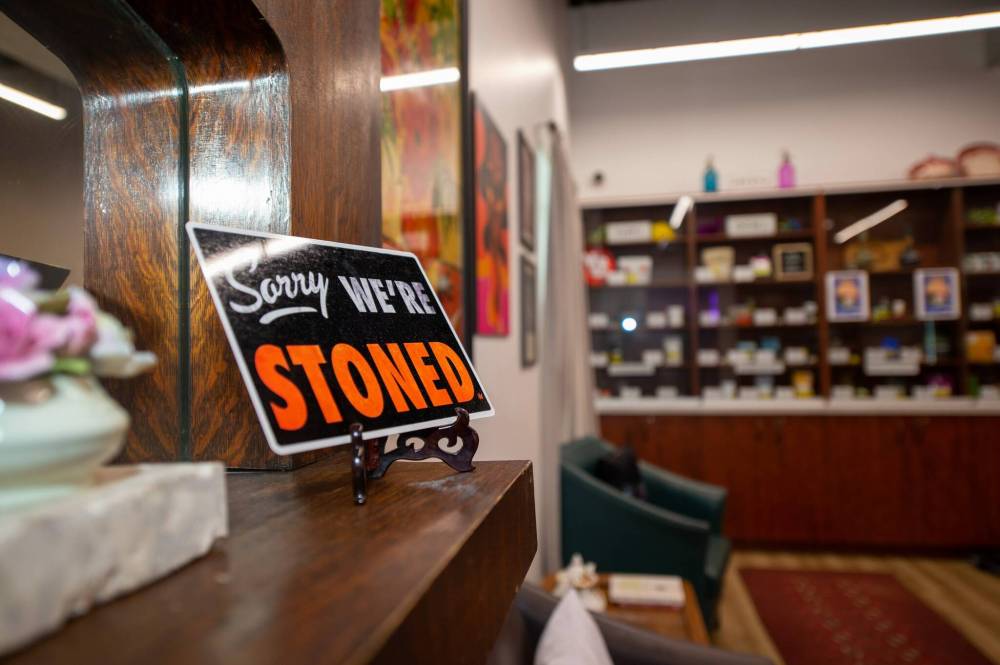
“I know black-market dealers who feel like the heat is completely off of them, because even if they get caught, they could be delivering legal weed,” he says. “The packaging is such that it looks the same.”
Still, he wants his children to buy from a legal shop.
“The new user who didn’t want to go to a dispensary and wanted to go to the black market should definitely be concerned with what’s in their weed,” he says. “That’s just substance use 101.”
He says his friends buy edibles legally, and he’ll buy TobaGrown products, because the profits support a court case fighting the province for everyday users to grow their own cannabis plants.
“If I buy black-market marijuana edibles, the dosage can be pretty crazy,” he says.
The government should focus on converting the heavy users to legal purchasers, says Andrew Hathaway, a University of Guelph sociology professor who studies cannabis use.
“The new user who didn’t want to go to a dispensary and wanted to go to the black market should definitely be concerned with what’s in their weed. That’s just substance use 101.”
– Brad Poulos
“I’ve seen figures (showing)… 10 per cent or 20 per cent of users account for 80 per cent of marijuana use (in Canada),” Hathaway says.
Twenty-nine per cent of Canadian users reported consuming more cannabis in 2021 because of of the pandemic, a Statistics Canada survey revealed.
Retailers placed $80.2 million worth of orders through Manitoba Liquor and Lotteries in the 2020-21 fiscal year, a 55 per cent increase from the year prior (which was before the explosion in retail licences issued to the private sector).
Shops’ retail sales hit a monthly high in Manitoba of $15.5 million last April, Statistics Canada says. Monthly sales have stayed above $12 million for most of the past year.
In December 2018, Statistics Canada’s first month of Manitoba data, the province’s legal cannabis industry collected $5.4 million.
● ● ●
“The industry is in a state of consolidation,” says John Arbuthnot, CEO at Delta 9 Cannabis.
Delta 9 now has 13 shops in Manitoba and 35 across the country. It announced in March that it had acquired Uncle Sam’s Cannabis in Alberta — a total of 17 stores — for $12.5 million.
In June, Calgary-based High Tide Inc. bought two Bud Heaven stores in Ontario. Last year, Ottawa-headquartered HEXO Corp. (a cannabis producer) acquired Zenabis Global (another producer) for $235 million.
“It stands to reason that… consolidation is going to roll out a large amount of market share into a small number of names,” Arbuthnot says. “That’s where we feel Delta 9 can be positioned to go from 35 stores to 50 to… north of 100.”
The largest cannabis retailers make up a small portion of the Canadian industry’s market share, he says. It’s a far cry from more established industries, such as groceries, where a few giants dominate.
Delta 9 began with four Manitoba stores in the first two years after legalization.
Still, the big players have not been immune to revenue drops: Delta 9’s first location, on Dakota Street, had attracted $15 to $16 million annually, Arbuthnot says, but the income has declined as nearby shops have opened their doors.
Delta 9’s first quarter’s earnings before interest, taxes, depreciation and amortization was posted at -$1.6 million, the only negative EBITDA in more than a year. Ian Chadsey, Delta 9’s vice-president of investor relations, attributes it to business-to-business sales — the revenue fluctuates drastically based on how many grow pods the company sells, he said.
Aurora Cannabis, one of Canada’s largest publicly traded cannabis retailers, reported a net loss of $1 billion in its latest quarter. It’s closing its Edmonton production site and laying off 12 per cent of its workforce.
Still, many of the large corporations have production to fall back on. Delta 9 made medical cannabis products in its facility before recreational use was legalized.
Arbuthnot calls the vertical integration “rather key” to the business model.
“It just allows us to facilitate sales of our own products through our own retail, as well as really keep the pulse on what consumers are wanting,” he says.
Several smaller retailers express frustration at not being able to order all the stock they want through MLL; there’s limited supply, companies can vie for the same products and larger orders seem to be filled first, they tell the Free Press.
“From what we’re hearing, there are a large number of operators in the Manitoba market that are poised to be closing their doors over the next 12 months”
– John Arbuthnot, CEO at Delta 9 Cannabis
Cannabis retailers can order as much of a product as they wish, so long as it’s available, a Manitoba Liquor and Lotteries spokesperson says.
MLL transmits orders to suppliers, and the suppliers determine whether orders “can or will be filled,” the spokesperson says in an email.
“From what we’re hearing, there are a large number of operators in the Manitoba market that are poised to be closing their doors over the next 12 months,” Arbuthnot says.
Between June 1, 2021 and Monday, three LGCA retail cannabis licences were cancelled when stores closed.
According to Delta 9’s models, a sustainable Manitoba market would see about 125 cannabis shops — 33 less than the current number — Arbuthnot says.
● ● ●
Padilla, from Babette’s Cannabis, has joined a group of other small cannabis retailers looking to form an association.
“The viability of the company is something that I think is in everyone’s mind, of their own companies,” Padilla says. “We knew it was competitive… (but) the hill is a little bit more uphill than we thought.”
Banding together will give independent retailers who face many hurdles more power, she says.
For one, there are strict regulations on advertising.
“That kind of ties your hands in terms of getting your name out there,” Padilla says.
Additionally, all recreational pot shops must pay an annual social responsibility fee of six per cent of their revenue to the province.
The LGCA receives “a portion” of the fee, according to Lisa Hansen, the authority’s communications analyst. The LGCA will put the $564,340 it got in 2020-21 towards cannabis regulation and public education campaign costs, she says.
It’s not clear what the rest of the social responsibility fee is used for.
Margins are tight in the legal industry, which constantly competes on price with the illicit market.
“The (businesses) that have deep pockets, that are well-capitalized, are going to be in a position probably to wait out the ones that are not,” says Poulos of Toronto Metropolitan University.
Having a good location and sustainable rent is key for retailers, Poulos says.
A growing concern for some small shops is that grocery stores and gas stations can sell cannabis with LGCA-issued controlled-access licences, which allow them to sell as long as weed products aren’t visible to customers.
The licences have been available since legalization, but the first of them was issued in late 2020.
Five retailers had controlled-access licences as of Monday, including a Husky gas bar in Richer.
“We’ll see who’s going to survive and who’s not,” says Bellan from Character Co. about small cannabis shops. “We have no idea what it will take. Hopefully we’re doing something right.”
● ● ●
Britton remains hopeful.
After all, new cannabis-infused drinks will soon be introduced. Chocolate bars and gummies are on sale — that wasn’t allowed three years ago.
Festivals can have beer vendors. Maybe, one day, they can have cannabis sellers, too, he says.
“There’s just so many possibilities that are still to come,” he says. “I think that that’s what’s exciting right now, is all these things are happening.”
The industry’s competitiveness forces innovation, he says. Now, there’s enough selection in the province for retailers to curate their menus and be diverse, even though they must buy from the same list.
“We have McDonald’s, and we have Five Guys and we have St. James Burger Co.,” he says. “The big guys are going to exist… then there’s going to be those (little) gems sprinkled out throughout the town and province.”
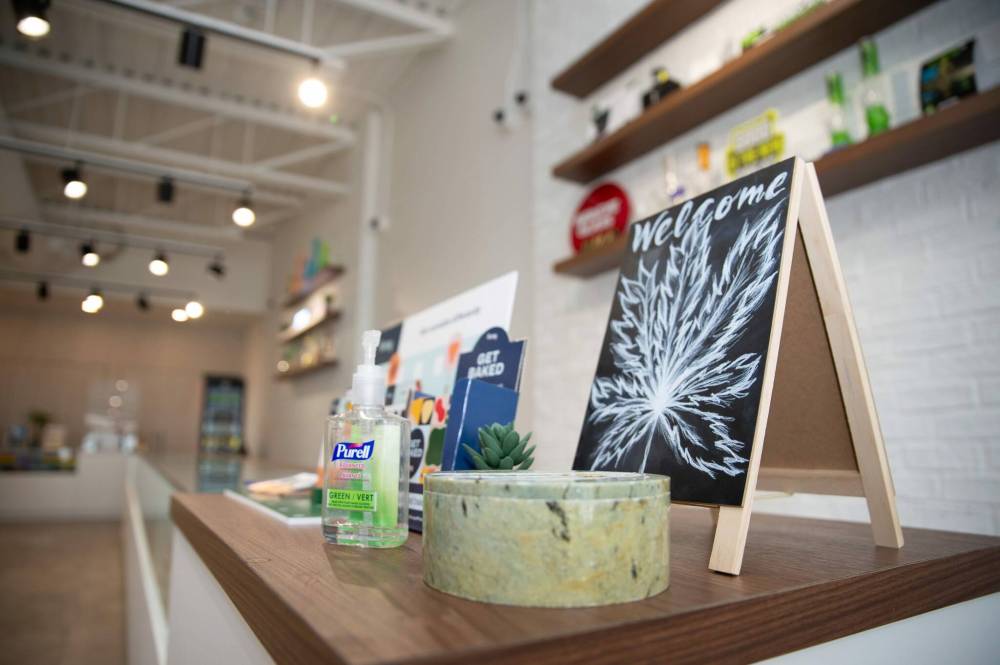
Independent shops have found niches to stand out.
Padilla painted her shop’s walls purple. A small fireplace, a flowery teapot and a black-and-white print of a dog similar to her pooch Copie, are part of Padilla’s efforts to create a cosy atmosphere.
Mistik Cannabis Co. is proudly Indigenous owned. A blue-haired, joint-smoking woman features in a colourful wall mural painted by Anishinaabe artist Jackie Traverse. The shop employs Indigenous staff.
Yes, there will be store closures, says Bekevich of Mistik. But, those who survive the storm will be part of an exciting, dynamic industry, she believes.
gabrielle.piche@winnipegfreepress.com
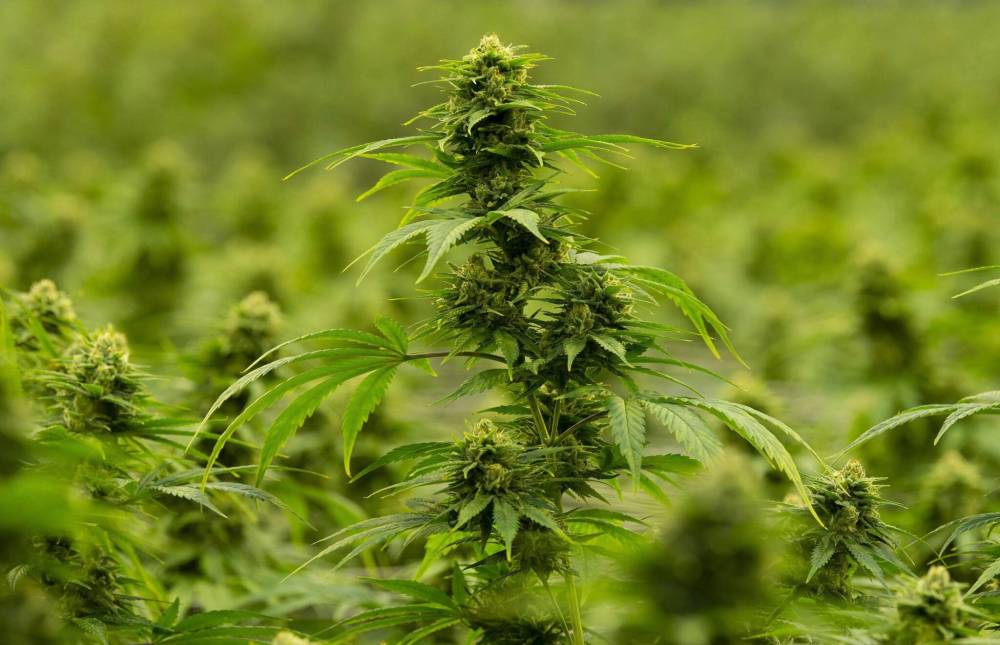
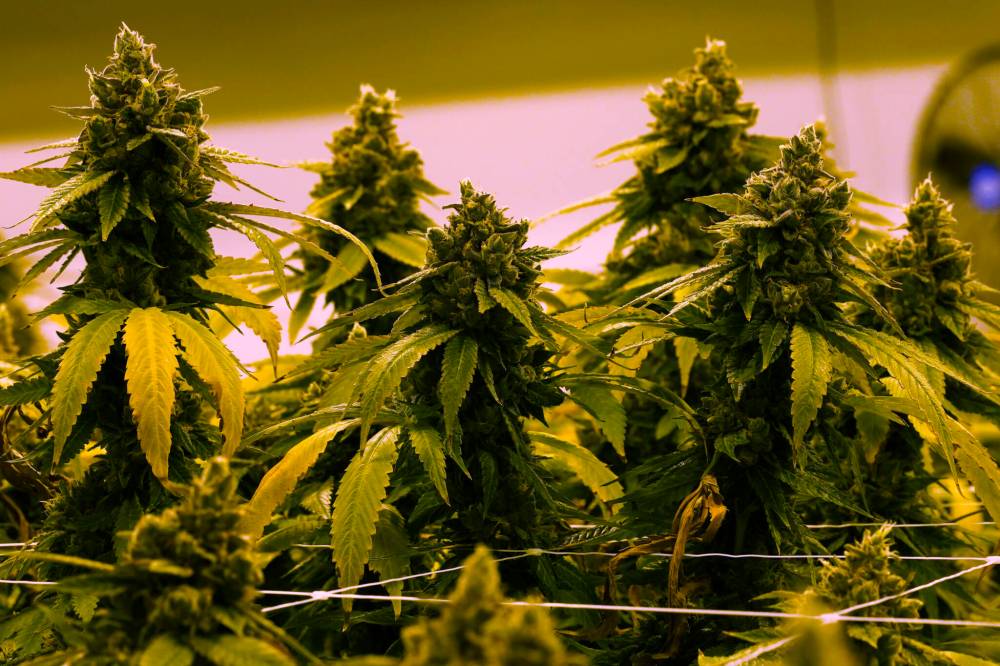

Gabby is a big fan of people, writing and learning. She graduated from Red River College’s Creative Communications program in the spring of 2020.
Our newsroom depends on a growing audience of readers to power our journalism. If you are not a paid reader, please consider becoming a subscriber.
Our newsroom depends on its audience of readers to power our journalism. Thank you for your support.



